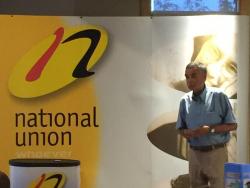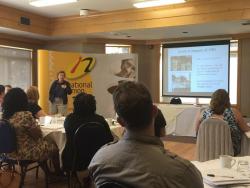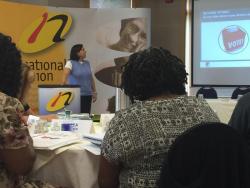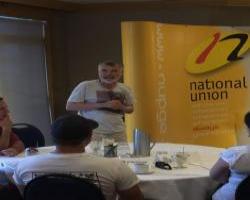This is an archive of news stories and research from the National Union of Public and General Employees. Please see our new site - https://nupge.ca - for the most current information.
"When our members’ communities are increasingly under threat from the effects of climate change, or their children and grandchildren can’t find work, we need to be speaking out.” — Larry Brown, NUPGE President
Keele (22 August 2016) — The Natonal Union of Public and General Employees' (NUPGE) Leadership Development School kicked off as NUPGE activists from across Canada and from our sister unions in the US, Australia, and Britain got down to work. Over the last 18 years, the school has helped develop dynamic leadership within the components of the National Union.
Opening the school, Larry Brown, NUPGE's President, talked about why unions take on issues like climate change or precarious work. “Our responsibility to protect our members doesn’t end when they leave work. When our members’ communities are increasingly under threat from the effects of climate change, or their children and grandchildren can’t find work, we need to be speaking out.”
School develops leadership for labour movement and community
The sessions on strategic planning and organizational change were developed by Dr. Elaine Bernard, Executive Director of the Harvard University's Labor and Worklife Program. Bernard has taught at every NUPGE Leadership Schools. On the first day of the school, Bernard led discussions on what qualities leaders need and how we can prepare effectively for the challenges we will face.
Elisabeth Ballermann, NUPGE's Secretary-Treasurer, summed up that one of the goals of the School is to ensure leaders aren’t afraid to say, “We have a plan, but if important new information comes to light, we’d better be prepared to revisit the plan.”
Fighting climate change by greening the workplace
Professor John Calvert from Simon Fraser University spoke about what unions can do to respond to climate change. He suggested that the focus for unions needs to be what can be done to reduce emissions in the work place.
“Almost every job in our economy can be made greener,” said Calvert.
He explained that climate change is reaching the point where no one will be immune from its effects. We have just gone through the hottest July on record. Arctic sea ice is 260,000 square kilometres less than the previous low point. Things have reached the point where even small-c conservative organizations like the World Bank are calling for action.
Calvert warned that focusing exclusively on green jobs ignores the fact that there are opportunities to reduce emissions in almost every sector. He pointed to how, when hospitals or prisons outsource food services, meals are often prepared in one central facility and shipped hundreds or thousands of kilometres.
 |
 |
 |
 |
Communicating the value of public services
Elaine Meija is a public policy consultant, and worked with Public Works, an organization in the U.S. dedicated to building support for a strong and vibrant public service, for 6 years. Mejia walked participants through the recent communications research on how unions and activists can increase support for public services.
It is a challenge often to get the public to oppose privatization and protect public services because of the negative attitude people have towards government. Meija outlined how people have become disconnected from governments and see themselves as subjects rather than citizens. When people think of government they think of corrupt politicians rather than the services on which they rely.
Meija outlined what the research said is needed to change that perception: we have to start with where people are, but tap into more productive ways of thinking about things. An example she provided was that, when talking about public services, we need to shift the focus from politicians to what we have achieved through government, such as Medicare. It also means talking about what government is supposed to do instead of suggesting that the government is currently doing a good job.
Democracy has to mean more than voting every 4 years
“To get them in a really positive and constructive place, you have to instill in them a sense of empowerment again because people are feeling like subjects not citizens,” said Meija.
“We need to give them a different idea about how democracy works. Democracy works when we also go a little bit beyond voting.”
“Voting Plus One” was the message the research found was most effective at getting people to think about how democracy works. This should be backed up with success stories, starter kits and examples of simple steps government can take to improve processes.
Ready for a week of hard work
Participants at the school know they are coming to work in Keene and it showed in the level of participation and thoughtful questions posed to speakers.
The school runs until Friday, August 26, and concludes with a graduation presentation from National President Larry Brown.
NUPGE
The National Union of Public and General Employees (NUPGE) is one of Canada's largest labour organizations with over 360,000 members. Our mission is to improve the lives of working families and to build a stronger Canada by ensuring our common wealth is used for the common good. NUPGE
